When the movie reaches the last minute, watching Mario walk through the once struggling oil pond with ease and excitement, we must be in our hearts Also as happy and excited as him. And when the dance steps in the bar are getting more and more dizzy, when Mario turns the steering wheel more and more, we all tighten our hearts. We never hope that after so many hardships, he will not escape the doom of life. .
However, the truck fell rumblingly down the cliff. This fall suddenly stunned me. I was stunned, with a face full of perplexity and doubt, why is the director so cruel that he must let Mario die? Isn't it a happy ending?
However, when I calm down and think about it clearly, I can understand that this fall is where this movie can become a classic.
Some people may argue that the director is deliberately creating a "non-reunion" ending in order to get his films out of the category of "vulgar movies". However, I think that the director set up this way, it should be more than just a simple layer of thinking. I will briefly talk about my views below. Movies have always been an art form with one thousand people and one thousand interpretations. The so-called film reviews are mostly based on personal experience and thinking about the director’s guesses, whether they are close or not. It can only approach the film along an asymptotic line, but the film itself is not clear, and each picture can have multiple interpretations. Therefore, if there are objections, I hope to understand the following.
In my opinion, the interpretation of this movie can be cut from some points.
First of all, let’s look at the composition of the characters in this movie: there are five main characters, unemployed Mario, down-and-out old businessman Ruo, cleanliness Bamba, fat Lu Ji, and uneducated but beautiful Linda.
Among these people, there is only one absolute protagonist, Mario, who finally fell into the valley. His role in the movie is from the beginning of the movie to the last scene. And the settings of the other few people, except for Bamba, almost all surround him.
The next thing I want to talk about is that the director clearly showed there, but some facts about Mario that are easily overlooked. These are all shown through the stories between Mario and the three people related to him, I will put it in a nutshell.
First of all Linda, she represents love. Mario likes Linda, and Linda loves Mario sincerely. But for him, it seems that Linda is not a must. He can tolerate the bar owner and Linda in the same bed, and in some public places, he doesn’t give Linda the face that any woman should have. When Linda made a beautiful dress for a date to find him, he actually did it for He Ruo went to have a haircut and gave up a rare date that only happened once a month. When Linda climbed onto the truck full of nitroglycerin and begged him to stay, he even more resolutely opened the door and let Linda fall to the ground. It seems that Mario doesn't take Linda very much, and has abandoned her for Ruo several times.
Next is Lu Ji. This is his workmate and roommate, representing friendship. Needless to say, the director acted very clearly. When Ruo appeared, Mario resolutely gave up the precious friendship with Lu Ji for a fairly stranger, and left He Ruo with a discarded ticket.
Third, turn to if. If it is a very important character, it is the only one who will accompany Mario to the end. Let’s analyze, what drove Mario to give up love and friendship for him? It's actually pretty obvious. When Ruo appeared as a wealthy businessman wearing a luxurious suit and holding a whisk in his hand, Mario immediately stared at him, turning around him, thinking about something in his heart.
And when he learned that Ruo was in the same hometown with him, he seemed to see a glimmer of hope and quickly got close to him. What does Mario figure about? Later we learned that he hoped to get the money to leave this place from this wealthy fellow villager. Therefore, after Ruo appeared, he easily gave up his love with Linda and his friendship with Lu Ji. He is for money.
And here is one more detail we can pay attention to. When he first arrived, he hoped that Mario would pay him a $1 fare, but Mario shunned him to the bar owner. Then when Mario left the bar, he seemed to take out $1 from his pocket by accident and said that he didn't see it at first. We can easily think that for Mario, the poor ghost, would we not know the dollar on our body? This has already seen Mario's selfishness and scheming.
Afterwards, Mario learned that if there is no money, but after all, he and the oilfield boss have an affair, and there are still places that can be used. To put it another way, even if there is no place to use, Mario has already fallen out with Lu Ji. If he leaves Ruo, he can only be alone. It is better to stay with Ruo first and look further.
At this time, the oilfield accident happened and their chance to leave this place also came. After competitive recruitment, the four people got this difficult task with high rewards.
When the four were on the road, things gradually changed.
In the process, Ruo's status is getting lower and lower, because compared to Mario, he appears cowardly and timid. In order to accomplish this task, fear and cowardice must not be allowed.
Mario is brave, but his bravery does not count the cost.
At that corner, he almost squeezed Ruo off the cliff; when Ruo wanted to leave, he beat him severely, slapped the old man, and told him that he was still worthwhile; and later in the oil pond. , He even drove the car over, regardless of Ruo who was trapped under the branches, and ran over his legs. Ruo's use value was finally reflected here.
In the end, Mario completed the task, but the process was cruel. If the old man died at the end.
However, I think that Mario's selfishness, scheming, and disregard for friendship, love, and respect for the elderly that I mentioned above seem to be less obvious in the movie. Because we can see Mario's pain and his suffering. And the director didn't portray him into that kind of role of right and wrong, we will sympathize with him, we think he still has a conscience.
So what does the director want to say?
I regret that up to now I have not been able to have a clear and defensible interpretation of the topic "The Price of Fear".
I think the director should want to show the evil side of people, but the point is not entirely there. Perhaps what he wants to accuse is this cruel social reality.
The task proposed by the oil company is actually an unselectable choice. If you choose to accept it, you will be bombed to death on the road; if you choose not to accept it, you can only wait to starve to death in this place. Therefore, for the vague but still possible hope, one can give up everything else outside of the body, just to achieve one's own Consummation.
So the evil shown by Mario is the evil forced by reality. Of course, this may be a manifestation of selfishness inherent in human beings. Much like the evil revealed in "Dogtown".
The death of Mario is at least an explanation. Also expressed a kind of protest and helplessness. A small market like Mario needs to pay for his evil. And when he died, he was still holding the discarded ticket in his hand. This shows that he simply wanted to leave this place, but in the end this wish was still not realized. And behind this is the relentless exploitation of oil companies and capitalists.
I admire this movie very much, not to mention the plot, especially the photography. The only thing I feel is that the first half, although important, is a bit boring and lengthy. But after thinking about it, I was still willing to score five points to express my admiration for this movie.
View more about The Wages of Fear reviews











